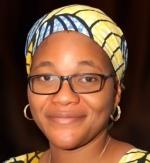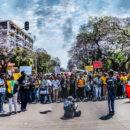CDD Analysis Centre: Matters arising from the Voting Phase, Nigeria 2015 Elections

 Several polling units across the country opened later than scheduled with the accreditation process commencing hours behind the expected time. The delay to this process, occasioned by the late arrival of election officials and materials, caused a lot of anxiety among voters as well as an overlap of procedures in many polling units including those in Abuja. However, the conduct of voters in response to this has been largely peaceful. The turnout and enthusiasm of voters across Nigeria is highly commendable despite insinuations that the election would be marred by violence.
Several polling units across the country opened later than scheduled with the accreditation process commencing hours behind the expected time. The delay to this process, occasioned by the late arrival of election officials and materials, caused a lot of anxiety among voters as well as an overlap of procedures in many polling units including those in Abuja. However, the conduct of voters in response to this has been largely peaceful. The turnout and enthusiasm of voters across Nigeria is highly commendable despite insinuations that the election would be marred by violence.
Security of the polling environment
The polling environment has been reasonably secure and largely without disruption. Members of the Police Force and other security agencies established a noticeable presence within the polling environment with most operating unarmed. The general view of the security presence at polling units is positive. Notwithstanding, there were a few cases of intimidation and harassment of voters by overzealous security agents and party thugs/supporters. In Sokoto metropolis, voters were prevented by security agents from taking photos and recording the electoral procedure. Those who tried to were harassed by the security agents while accredited election observers were allowed.
Card reader performance
Following several reports of widespread challenges with card readers, INEC directed election officers to manually accredit voters using the voter register. Based on media reports, a high number of card readers failed to authenticate PVCs or recognize the fingerprints of voters. The late deployment of personnel and materials, as well as the failure of the card readers, meant the accreditation process ran longer than expected. For example, in Kwandila ward in Tarauni LGA, Kano state, and in some parts of Anthony in Lagos state, accreditation was still ongoing at 4pm on 28th (Saturday).
Voters’ behaviour and turnout: compliance and irregularity
Feedback from across the country shows that there were long queues of enthusiastic voters. This large turnout can be linked to the success of voter and civic education, and the relatively peaceful polling environment. In Sokoto, there were problems of crowd control in some of the polling units. The general behaviour of voters was adjudged satisfactory even in the midst of the challenges encountered during the accreditation process. In many polling units in Mbaitoli local government area (LGA) in Imo state, people remained calm where elections did not take place due to logistical problems. There were cases in Uyo and Rivers states where politicians and their supporters insisted on inspecting the result sheets before accreditation started. This delayed the commencement of accreditation in the affected polling units. Across the country, persons with disabilities (PWD) were given special attention.
Quality of voting procedure (timeliness, efficiency, effectiveness etc)
Electoral irregularities were witnessed by field observers in some polling units in Kano and Sokoto states where party supporters were unduly assisting election officials in the polling process. In Lagos, there were severe logistical problems with the delivery of voting materials, particularly ballot boxes. Voting cubicles were not seen in several polling units in Kano, Kaduna and Osun States which means voters were unable to cast their votes in secret. However, cooperation among observers, security agents and election officials was cordial.
Violence and Conflict
In addition to our earlier report on the detonated bomb in Enugu and the explosions in Akwa, Anambra states, one of our observers in Ebonyi state witnessed the hijacking of a vehicle conveying election officials and materials and the assault on some members of the National Youth Service Corps (NYSC). The incidents occurred in Ijiam-Ekpomata ward, Ikwo LGA of the State. In Rivers State, there were reports of sporadic shooting in Ozuaha community in Ikwerre LGA by thugs who barricaded the road into the town and in the process opened fire on a team of policemen and military police escorting NYSC members to polling units.
Concluding Remarks
The conduct of the 2015 Presidential and National Assembly elections recorded mixed outcomes. While fears in some quarters that Election Day would be marred by serious violence were allayed to a large extent, some instances of technical hitches, non-compliance with electoral regulations and other forms of electoral malfeasance were recorded in some states of the Federation. INEC’s directive to its field officers to discontinue the use of card readers for the authentication of prospective voters came suddenly in the middle of the accreditation process. It is not impossible that this may have caused confusion among the voters, and also temporary disruption of the polling process. The move by INEC to revert to manual accreditation of voters may be justifiable in view of the challenges associated with the card readers. However, it would seem that INEC did not consider the likely implications of its abrupt decision on the overall electoral process.
Pockets of violent conflict reported across the country, some of which may not be election-related, may continue to instill fears among the electorate in the conflict zones notably the North-East, North Central and the South- South zones. Instances of irregularities recorded in some states such as the accreditation and voting of the under aged can impact upon the integrity of the electoral process. Against this backdrop, it is imperative that all stakeholders, particularly INEC, political parties and security agencies, should note the observations above with the view to improving their performance in subsequent elections.
Idayat Hassan – Director, Centre for Democracy and Development, Abuja.





